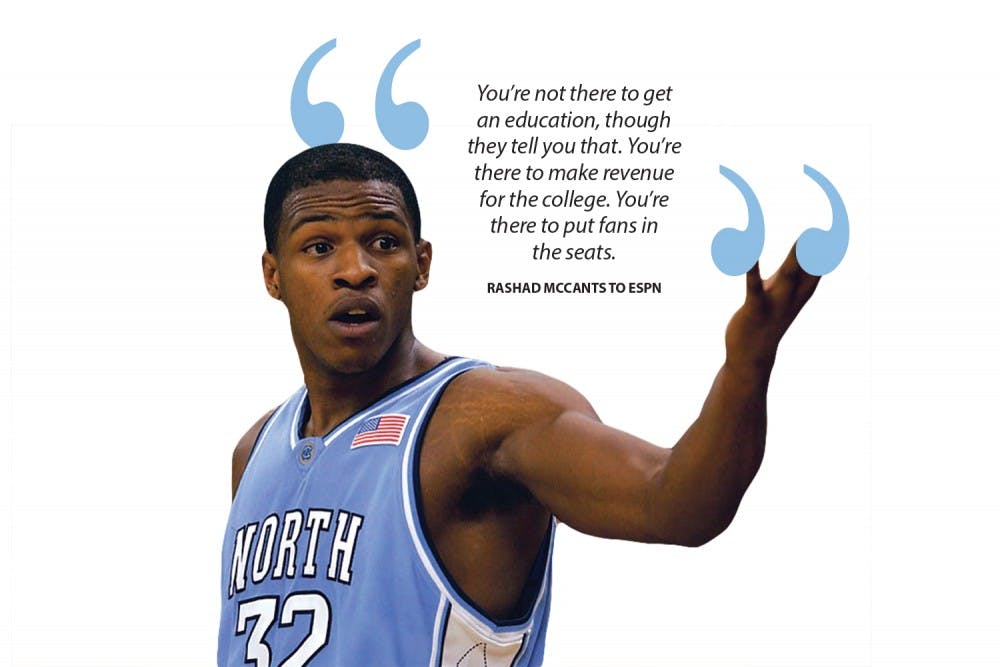“You’re not there to get an education, though they tell you that,” McCants said in the interview. “You’re there to make revenue for the college. You’re there to put fans in the seats. You’re there to bring prestige to the university by winning games.”
In an external review done by former Gov. James Martin in 2012, 216 course sections in the African-American studies department were identified with proven or potential irregularities dating back to 1997. The review also found 454 suspected unauthorized grade changes in the department.
Dr. Lewis Margolis, a professor in the Gillings School of Global Public Health, said McCants deserves credit for speaking out about his experiences at UNC.
“I think we have much evidence that educational compromises have been made,” said Margolis, who is often involved in the discussion of college athletics. “The fact that an athlete has come out and confirmed that is not surprising. I think it’s to his credit to acknowledge that this went on. Too often the athletes are silent, have been silent throughout this entire controversy.”
The 16 members of the 2005 national championship team, excluding McCants, issued a statement of their own after his interview — saying their academic experience at UNC differed from their former teammate’s.
'‘We are proud of our accomplishments both on and off the floor at UNC,” they said in the statement. “With conviction, each one of us is proud to say that we attended class and did our own academic work.”
Houston Summers — a member of the Student-Athlete Advisory Council and the track and field team — said his coaches and teammates make him see the value in getting a proper education from UNC, even though he would rather spend more time on his sport.
“But that’s not what we’re at Carolina to do,” he said. “We’re there to get an education. And our sport is just an avenue to help us do that.”
Pointing fingers
On Saturday, 11 former UNC players gathered at the Smith Center in support of Williams as he sat down with Jay Bilas, an ESPN college basketball analyst. In the interview, Williams refuted McCants’ claims and said his performance in the classroom didn’t reflect those of former players.
“Every one of those players that are sitting over there and every player I’ve had make me feel like they did their work, and we emphasize that and we push them towards that all the time,” Williams said during the interview.
Before being named the head coach at UNC in 2003, Williams coached at the University of Kansas for 15 seasons. Rex Walters, who played under Williams from 1991-93, said Williams always focused on his players’ academic success.
To get the day's news and headlines in your inbox each morning, sign up for our email newsletters.
“He talked about graduation all of the time,” Walters said. “He talked about getting that degree, going off and doing bigger and better things.”
Bilas said he walked away from the interview convinced Williams was unaware of McCants’ situation.
“The bottom line to me is that I think this is more of an academic issue than an athletic one,” Bilas said. “And if you’re asking a basketball coach to be responsible for the course offerings of a department or of any department, that’s asking a lot and I don’t know if that responsibility should reasonably be on any coach.”
The campus responds
Deborah Stroman, the director of sport entrepreneurship at UNC and a member of the Faculty Athletics Committee, said she was surprised McCants never spoke up during his time at UNC.
“Once you realize you did not receive what you thought the University owed you, why didn’t you speak up, especially as a confident athlete?” she said.
After the interview went live on Friday, director of athletics Bubba Cunningham released a statement and encouraged McCants to talk with Wainstein and come back to UNC to finish his education.
UNC’s Faculty Athletics Committee released a statement saying its chairwoman Joy Renner has requested to meet with Wainstein to discuss faculty concerns with recent claims in the media.
“It was our intent to request to meet with him or share our questions and information after he had time to follow the team’s findings and direction,” Renner said in an email.
Down the road
In an email, Meghan Durham, a spokeswoman for the NCAA, said it is the responsibility of the University to determine if academic misconduct has occurred and if it should be reported to the NCAA.
“Academic integrity is central to the mission of the NCAA, its member schools and higher education,” Durham said in the email.
In Folt’s Tuesday email, she said once the findings are released to the public, the University will be able to build on the reforms that have already been started and be able to respond to more specific claims and allegations.
“We recognize that we will remain part of the broader national conversation on these issues,” she said in the email. “As the nation’s first public university, we also have a responsibility to lead it — both with words and actions. We will do this thoughtfully, responsibly and thoroughly, in the finest traditions of this great University.”
Margolis said he hopes the report will allow the University to move forward and answer more questions.
“The more basic question is, is it possible to have a big-time sports program in basketball and football and to get a top-notch education at the time?” he said.
Senior writer Jenny Surane contributed reporting.
Contact the desk editor at sports@dailytarheel.com.



